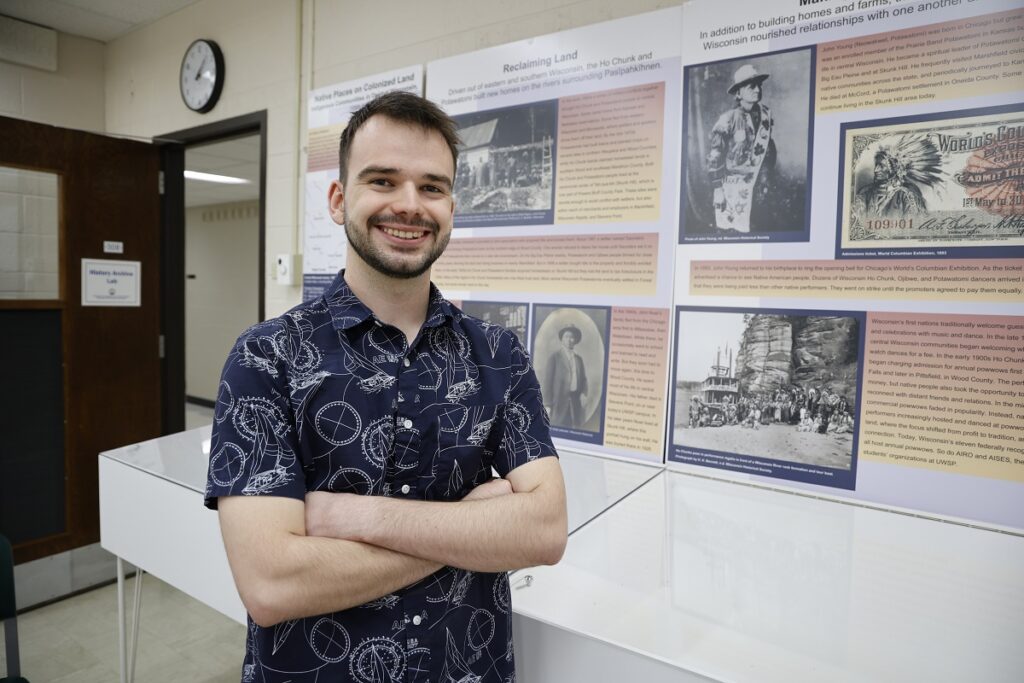
Dylan Potter’s interest in history led him to working with Professor Rob Harper, researching local Native American tribal history and culture.
When 2023 University of Wisconsin-Stevens Point English graduate Dylan Potter, Crandon, began his independent research with History Professor Rob Harper, he had no expectation where the work would take him – just a curiosity of how the Native American indigenous people made a life and left a mark around the Stevens Point area.
Two years later, the gathering of personal narratives and historical documents through archival research by student interns like Potter have begun to shape the known histories of Ho Chunk, Menominee, Ojibwe and Potawatomi people of central Wisconsin.
“Performing the research was one of the greatest things that I’ve done in my college career,” Potter said.
Harper’s student interns researched the period from 1850-1930, during which the region’s Ho Chunk, Menominee, Ojibwe and Potawatomi peoples rebounded from the traumas of ethnic cleansing and laid the foundation for native sovereignty in Wisconsin today. The project will eventually include searchable online archives and interactive cartography using historical maps. A public access website is under construction.
“We can tell compelling stories about the native peoples of Central Wisconsin,” said Harper. “This history is important for our region and also has implications for the study of Native American history elsewhere.”
Assistant Dean Tobias Barske, School of Humanities and Global Studies, worked with Harper and former Museum of Natural History director Sarah Scripps to secure funding through the Wisconsin Humanities Council for the first year of the research. The UWSP Pathways program funded the internships in 2022-23.
The historical project aims to trace the story of Native American communities living in Central Wisconsin. In the 1860s to 1880s, Ho Chunk, Menominee, Ojibwe, and Potawatomi people regularly traded and did seasonal labor in Stevens Point. They lived in a pine grove east of downtown on the north side of Main Street. Settlers periodically drove them away, but they kept returning to that grove, where they buried their loved ones in an abandoned quarry. In 1894, the state acquired the land, including the burial site, to establish the teacher’s college that later became UW-Stevens Point. The site is now memorialized on campus with a mural for the Ancestors Buried Beneath Us.
The research project interns used materials from the Wisconsin Historical Society in Madison, including photos dating from the mid-1800s. Potter, who has always loved history, slowly and methodically read through microfilm, databases, letters and documents in archives held across the state.
“At times I could get through 100 slides in an hour,” he said. Other times his progress moved at a quarter of that pace. It was the photos, oral histories and deeply personal accounts that Potter said he enjoyed discovering and documenting most.
One such story was of a Potawatomi tribal member named Joe (Miaogistug) Wisconsin. As Potter learned, he went on to establish towns in Waupaca County. After surviving the epidemic, they built a new home near Laona where the Forest County Potawatomi settled.
Off campus, Potter traveled to the Forest County Potawatomi Museum and spoke with an elder in Wittenberg about the Ho Chunk nation’s history and culture. He was eager to increase his awareness and move ahead the understanding.
Additional history came directly from UW-Stevens Point Native American alumni, including 1971 graduate Gary Kmiecik, Lac du Flambeau Ojibwe and the co-founder of AIRO, the Native American student organization on campus. Kmiecik described a dramatic confrontation between students and Lee Sherman Dreyfus over a museum exhibit displaying human remains. Lanette Walker, a 2023 graduate from the Ho Chunk Nation, and Ho Chunk Nation President-Elect Jon Greendeer, a 2002 graduate, also contributed.
Postbaccalaureate student Jarita Bavido was among the first cohort in the Native American and Indigenous Studies certificate program, coordinated by Harper and launched in 2022. She has helped to document the rich tribal history working with thousands of historical records and attending conferences with the help of a College of Letters and Science Undergraduate Research Grant. Notably, she said, the stories in the archives share a story of resilience.
“There are histories that have been collectively ignored by non-Indigenous folks for a long time. Doing the research has given a glimpse into indigenous presence and ‘survivance’ here in Stevens Point — that is, it’s not just the ancestors beneath us but the Ho-Chunk, Potawatomi, Menominee and Ojibwe people who are still here today,” said Bavido.
Some of those stories were curated as historical materials and research for the History 390 course, “Museum Exhibitions,” last fall. Students installed a display in the Dreyfus University Center titled “Pasīpahkīhnen: Stories of Survivance.”
In the spring of 2024, students in the History 393 course, “Wisconsin Indians,” will do additional research to support future displays and exhibits to advance community awareness of the area’s tribal past and present. Faculty and students will continue to share what they uncover through research about the tribal ancestors and the communities still living across the region.
“I’m proud of what we accomplished,” said Barske. “We’re moving forward and getting closer to having opportunities for students to learn about central Wisconsin and its historical past, as well as having a place to reflect on it.”
Written by UW-Stevens Point
Link to original story: https://www.uwsp.edu/news/native-american-tribal-history-research-2023/
